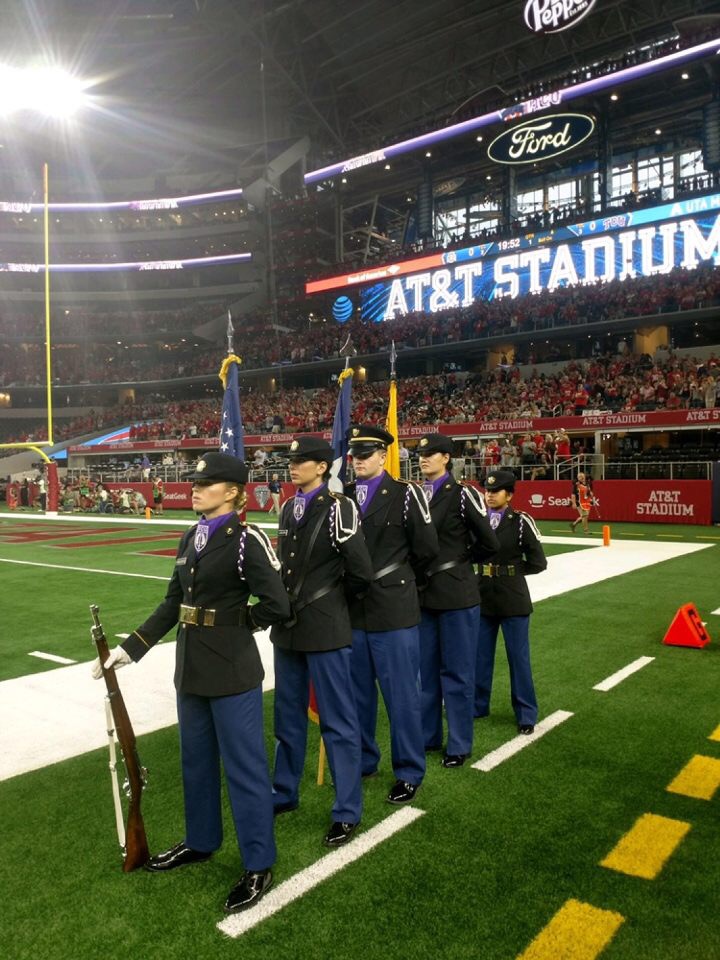The 5 a.m. alarm blares as TCU ROTC cadet team leader, sophomore Issie Dunkleberger, rolls out of bed, stretches for the sky and throws on her APFU, the Army Physical Fitness Uniform, which is an Army t-shirt and matching basketball shorts. The air is cool, and the sky is still black as she eats a banana walking over to meet her platoon for their early morning hours Tuesday workout at the University Recreation Center. Once inside, the 115 cadets split into two groups on separate basketball courts and line up in single file rows to begin their stretches. Each stretch is hollered out by name, a second passes, and the group relays back the name to the stretch leader in unison with as much enthusiasm as they can muster. The first set of exercises in their PRT, or physical readiness test, is 100 pushups for male cadets that are 21 years of age. For female 21-year-old cadets, it’s 19 pushups. The pushups are then followed by 100 sit-ups, 100 burpees and then 100 air squats for both men and women. Dunkleberger is one of 39 other women in TCU Army ROTC — a position she said comes with strenuous expectations. “I feel the pressure to be smarter, stronger and faster than my male counterparts,” Dunkleberger said. “Even when I exceed those expectations, they’re still there.” Dunkleberger said she has come across a lot of criticism during her time in ROTC. She recalls specifically this summer, during their ground’s training, where she said her male peers were quick to denounce her tactical strategies. “When I went to cadet summer training, my decisions were constantly criticized,” Dunkleberger said. “I had my subordinates telling me ‘no’, especially the males who didn’t think I was capable of making these educated decisions.” Women being criticized for taking initiative in leadership positions found its way to the top of the command chain last week after Defense Secretary James Mattis said “the jury is still out” on the success of having women serve in combat military roles. Mattis said the sample size of women soldiers is too small to make clear determinations. “This is a policy I inherited, and so far, the cadre is so small we have no data on it,” Mattis said. “We’re hoping to get data soon.” Mattis has asked Army and Marine leaders for data and information on if having women in “close-quarters fighting” is a military strength or weakness. Male or female, after their time in the TCU ROTC program the cadets, the majority of whom are on scholarship, are required to serve four years of military active duty. Army Reserve and National Guard cadets are required to serve eight years of active duty. As of 2018, women accounted for 16 percent of enlisted forces and 18 percent of the officer corps, according to the Council on Foreign Relations U.S. military demographics. The Marines have the lowest percentage of women at 8 percent with 7.5 percent in their officer corps. The Army is comprised of 14 percent women who are enlisted, 18 percent of those women are officers. The Navy and the Air Force currently have the highest percentage of women enlisted, at 19 percent each. Females make up 18 percent of Navy officers and 21 percent of Air Force officers. Gillian Longoria, a junior cadet platoon sergeant in the ROTC program, said that the gender debate should not overshadow more the important qualities of a soldier. “I don’t think it comes down to men or women,” Longoria said. “We acknowledge our anatomical differences, but the bottom line is we want strong leaders. Women can obviously play that role, we have for hundreds of years. I don’t really think it matters if you have this or that.” 
Categories:
Battles far from the front lines
Published Oct 4, 2018



